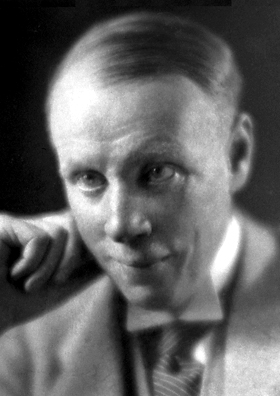
Sinclair Lewis
Harry Sinclair Lewis (February 7, 1885 – January 10, 1951) was an American novelist, short-story writer, and playwright. In 1930, he became the first author from the United States (and the first from the Americas) to receive the Nobel Prize in Literature, which was awarded "for his vigorous and graphic art of description and his ability to create, with wit and humor, new types of characters." Lewis wrote six popular novels: Main Street (1920), Babbitt (1922), Arrowsmith (1925), Elmer Gantry (1927), Dodsworth (1929), and It Can't Happen Here (1935).
Not to be confused with his contemporary, Upton Sinclair, novelist and political activist.
Sinclair Lewis
Harry Sinclair Lewis
February 7, 1885
Sauk Centre, Minnesota, U.S.
January 10, 1951 (aged 65)
Rome, Italy
- Novelist
- short-story writer
- playwright
- Main Street (1920)
- Babbitt (1922)
- Arrowsmith (1925)
- Elmer Gantry (1927)
- Dodsworth (1929)
- It Can't Happen Here (1935)
Nobel Prize in Literature (1930)
-
Grace Livingston Hegger(m. 1914; div. 1925)
2
Several of his notable works were critical of American capitalism and materialism during the interwar period.[1] Lewis is respected for his strong characterizations of modern working women. H. L. Mencken wrote of him, "[If] there was ever a novelist among us with an authentic call to the trade ... it is this red-haired tornado from the Minnesota wilds."[2]
Legacy[edit]
Compared to his contemporaries, Lewis's reputation suffered a precipitous decline among literary scholars throughout the 20th century.[40] Despite his enormous popularity during the 1920s, by the 21st century most of his works had been eclipsed in prominence by other writers with less commercial success during the same time period, such as F. Scott Fitzgerald and Ernest Hemingway.[41]
Since the 2010s there has been renewed interest in Lewis's work, in particular his 1935 dystopian satire It Can't Happen Here. In the aftermath of the 2016 United States presidential election, It Can't Happen Here surged to the top of Amazon's list of best-selling books.[42] Scholars have found parallels in his novels to the COVID-19 crisis,[43] and to the rise of Donald Trump.[44]
He has been honored by the U.S. Postal Service with a postage stamp in the Great Americans series. In 1960 Polish American sculptor Joseph Kiselewski was commissioned to create a bust of Lewis, now in the Great River Regional public library in Sauk Centre, MN.[45]